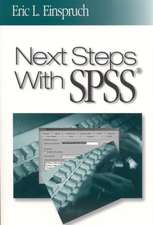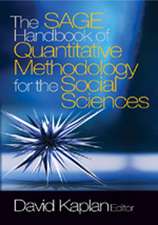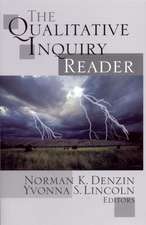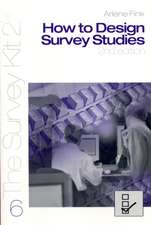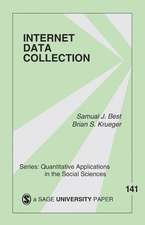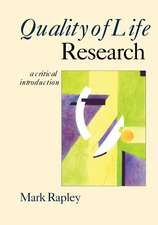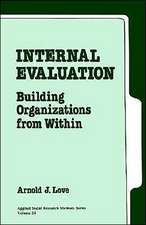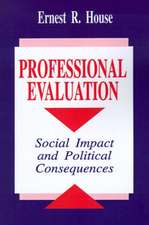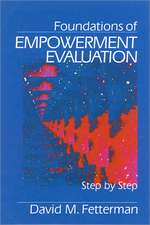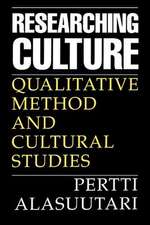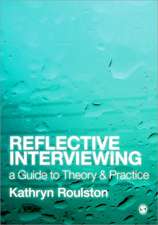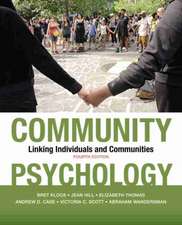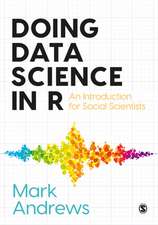Empowerment Evaluation: Knowledge and Tools for Self-Assessment, Evaluation Capacity Building, and Accountability
Editat de David Fetterman, Shakeh J. Kaftarian, Abraham Wandersmanen Limba Engleză Paperback – 3 noi 2014
Preț: 721.09 lei
Preț vechi: 936.47 lei
-23% Nou
Puncte Express: 1082
Preț estimativ în valută:
137.98€ • 144.06$ • 114.20£
137.98€ • 144.06$ • 114.20£
Carte disponibilă
Livrare economică 15-29 martie
Preluare comenzi: 021 569.72.76
Specificații
ISBN-13: 9781452299532
ISBN-10: 1452299536
Pagini: 392
Ilustrații: black & white tables, figures
Dimensiuni: 187 x 232 x 16 mm
Greutate: 0.64 kg
Ediția:Second Edition
Editura: SAGE Publications
Colecția Sage Publications, Inc
Locul publicării:Thousand Oaks, United States
ISBN-10: 1452299536
Pagini: 392
Ilustrații: black & white tables, figures
Dimensiuni: 187 x 232 x 16 mm
Greutate: 0.64 kg
Ediția:Second Edition
Editura: SAGE Publications
Colecția Sage Publications, Inc
Locul publicării:Thousand Oaks, United States
Recenzii
“The book provides depth and detail about the nature, variety, rigors, and credibility of self-evaluation, no small contribution…there is much of value here, strong evidence of an approach that, well-facilitated and comprehensively engaged, can make a substantial difference.”
"This text brings empowerment evaluation to life, and in doing so it offers all evaluators a large body of relevant concepts and tools for designing, implementing, and assessing evaluation efforts that engage, democratize, and strengthen stakeholder’s self-determination."
"This twenty year follow-up to the original, provides even better and richer stories about the versatility and utility of empowerment work in most social contexts. It expands our understanding of how empowerment evaluation is foundational to any effort to improve and measure growth in any community/social environment."
"One of the greatest evaluation innovations of the past two decades has been the development of a professional and systematic approach to self-evaluation called empowerment evaluation. This book offers you the latest cutting edge understanding of this powerful innovation and evaluation approach. May you be inspired and empowered as you adventure through the chapters in this outstanding volume!"
"Empowerment evaluation is the name given by David Fetterman in his American Evaluation Association (AEA) 1993 Presidential Address to an evaluation theory and practice intended '... to foster improvement and self-determination'...Empowerment evaluation [is] of the people, for the people, and very much by the people. Our role as evaluators [is] to be a critical friend, a coach, and a source of technical assistance when it [is] requested by the self-evaluating communities and organizations. No wonder that in 1993 'conversations and arguments spilled out into the hallways'...Empowerment evaluation and its leaders have received AEA’s highest accolades, such as the Myrdal Evaluation Practice Award (awarded to Fetterman in 1995 and Kaftarian in 1996), the Outstanding Publication Award (Wandersman in 2008), and the Lazarsfeld Evaluation Theory Award (Fetterman in 2000) as well as other recognition...Each chapter giving a case instance explicitly connects the 10 principles of empowerment evaluation to the processes, decision-making, participation, utilization, and other aspects of the evaluations reported...the results of more than 25 years of dedicated hard work and diligent thought are being shared with us. My recommendation remains, unequivocally and appreciatively: This book belongs on our shelves. Get it, read it, and, as appropriate, use it."
"This text brings empowerment evaluation to life, and in doing so it offers all evaluators a large body of relevant concepts and tools for designing, implementing, and assessing evaluation efforts that engage, democratize, and strengthen stakeholder’s self-determination."
"This twenty year follow-up to the original, provides even better and richer stories about the versatility and utility of empowerment work in most social contexts. It expands our understanding of how empowerment evaluation is foundational to any effort to improve and measure growth in any community/social environment."
"One of the greatest evaluation innovations of the past two decades has been the development of a professional and systematic approach to self-evaluation called empowerment evaluation. This book offers you the latest cutting edge understanding of this powerful innovation and evaluation approach. May you be inspired and empowered as you adventure through the chapters in this outstanding volume!"
"Empowerment evaluation is the name given by David Fetterman in his American Evaluation Association (AEA) 1993 Presidential Address to an evaluation theory and practice intended '... to foster improvement and self-determination'...Empowerment evaluation [is] of the people, for the people, and very much by the people. Our role as evaluators [is] to be a critical friend, a coach, and a source of technical assistance when it [is] requested by the self-evaluating communities and organizations. No wonder that in 1993 'conversations and arguments spilled out into the hallways'...Empowerment evaluation and its leaders have received AEA’s highest accolades, such as the Myrdal Evaluation Practice Award (awarded to Fetterman in 1995 and Kaftarian in 1996), the Outstanding Publication Award (Wandersman in 2008), and the Lazarsfeld Evaluation Theory Award (Fetterman in 2000) as well as other recognition...Each chapter giving a case instance explicitly connects the 10 principles of empowerment evaluation to the processes, decision-making, participation, utilization, and other aspects of the evaluations reported...the results of more than 25 years of dedicated hard work and diligent thought are being shared with us. My recommendation remains, unequivocally and appreciatively: This book belongs on our shelves. Get it, read it, and, as appropriate, use it."
Cuprins
FOREWORD - Stewart I. Donaldson
PREFACE
ACKNOWLEDGEMENTS
PART I: INTRODUCTION
1. History and Overview - David M. Fetterman
2. Empowerment Evaluation: Theories, Principles, Concepts, and Steps - David M. Fetterman
PART II: SCOPE AND BREADTH
Foundations
3. Mission Fulfillment: How Empowerment Evaluation Enables Funders to Achieve Results - Janice B. Yost
4. Foundation Strategy Drives the Choice of Empowerment Evaluation Principles - Laura C. Leviton
International
5. Capacity Building Through Empowerment Evaluation: An Aymara Women Artisans Organization In Puno, Peru - Susana Sastre-Merino, Pablo Mera, José Maria Díaz-Puente, María Jose Fernández-Moral
6. Teachers as Evaluators: An Empowerment Evaluation Approach - Janet Clinton, John Hattie
United States
7. Hewlett-Packard’s $15 Million Digital Village: A Place-based Empowerment Evaluation Initiative - David M. Fetterman
8. Empowerment Evaluation in Action in SAMHSA’s Service to Science Initiative: Cultivating Ownership and Enhancing Sustainability - Pamela Imm, Mathew Biewener, Dawn Oparah, Kim Dash
PART III: TOOLS
9. Getting To Outcomes: An Empowerment Evaluation Capacity Building Model - Abraham Wandersman
10. “No Excuses”: Using Empowerment Evaluation to Build Evaluation Capacity and Measure School Social Worker Effectiveness - Ivan Haskell, Aidyn L. Iachini
11. Empowerment Evaluation Conducted by 4th and 5th Grade Students - Regina Day Langhout, Jesica Siham Fernandez
12. Building Evaluation Capacity to Engage in Empowerment Evaluation: A Case of Organizational Transformation - Yolanda Suarez-Balcazar, Tina Taylor-Ritzler, Gloria Morales-Curtin
13. An Empowerment Evaluation Approach to Implementing with Quality at Scale: The Quality Implementation Process and Tools - Andrea E. Lamont, Annie Wright, Abraham Wandersman, Debra Hamm
14. Empowerment Evaluation: Evaluation Capacity Building in a 10-Year Tobacco Prevention Initiative - David M. Fetterman, Linda Delaney, Beverley Triana-Tremain, Marian Evans-Lee
PART IV: RESEARCH AND REFLECTION
15. Getting To Outcomes®: Evidence of Empowerment Evaluation and Evaluation Capacity Building at Work - Mathew Chinman, Joie Acosta, Sarah B. Hunter, Patricia Ebener
PART V: CONCLUSION
16. Reflections on Emergent Themes and Next Steps Revisited - David M. Fetterman, Abraham Wandersman, Shakeh J. Kaftarian
PREFACE
ACKNOWLEDGEMENTS
PART I: INTRODUCTION
1. History and Overview - David M. Fetterman
2. Empowerment Evaluation: Theories, Principles, Concepts, and Steps - David M. Fetterman
PART II: SCOPE AND BREADTH
Foundations
3. Mission Fulfillment: How Empowerment Evaluation Enables Funders to Achieve Results - Janice B. Yost
4. Foundation Strategy Drives the Choice of Empowerment Evaluation Principles - Laura C. Leviton
International
5. Capacity Building Through Empowerment Evaluation: An Aymara Women Artisans Organization In Puno, Peru - Susana Sastre-Merino, Pablo Mera, José Maria Díaz-Puente, María Jose Fernández-Moral
6. Teachers as Evaluators: An Empowerment Evaluation Approach - Janet Clinton, John Hattie
United States
7. Hewlett-Packard’s $15 Million Digital Village: A Place-based Empowerment Evaluation Initiative - David M. Fetterman
8. Empowerment Evaluation in Action in SAMHSA’s Service to Science Initiative: Cultivating Ownership and Enhancing Sustainability - Pamela Imm, Mathew Biewener, Dawn Oparah, Kim Dash
PART III: TOOLS
9. Getting To Outcomes: An Empowerment Evaluation Capacity Building Model - Abraham Wandersman
10. “No Excuses”: Using Empowerment Evaluation to Build Evaluation Capacity and Measure School Social Worker Effectiveness - Ivan Haskell, Aidyn L. Iachini
11. Empowerment Evaluation Conducted by 4th and 5th Grade Students - Regina Day Langhout, Jesica Siham Fernandez
12. Building Evaluation Capacity to Engage in Empowerment Evaluation: A Case of Organizational Transformation - Yolanda Suarez-Balcazar, Tina Taylor-Ritzler, Gloria Morales-Curtin
13. An Empowerment Evaluation Approach to Implementing with Quality at Scale: The Quality Implementation Process and Tools - Andrea E. Lamont, Annie Wright, Abraham Wandersman, Debra Hamm
14. Empowerment Evaluation: Evaluation Capacity Building in a 10-Year Tobacco Prevention Initiative - David M. Fetterman, Linda Delaney, Beverley Triana-Tremain, Marian Evans-Lee
PART IV: RESEARCH AND REFLECTION
15. Getting To Outcomes®: Evidence of Empowerment Evaluation and Evaluation Capacity Building at Work - Mathew Chinman, Joie Acosta, Sarah B. Hunter, Patricia Ebener
PART V: CONCLUSION
16. Reflections on Emergent Themes and Next Steps Revisited - David M. Fetterman, Abraham Wandersman, Shakeh J. Kaftarian
Descriere
In this volume, evaluators from a wide range of backgrounds assess how empowerment evaluation has been used in practice since the publication of the first edition in 1996, looking at theories and concepts, as well as evaluation principles.




